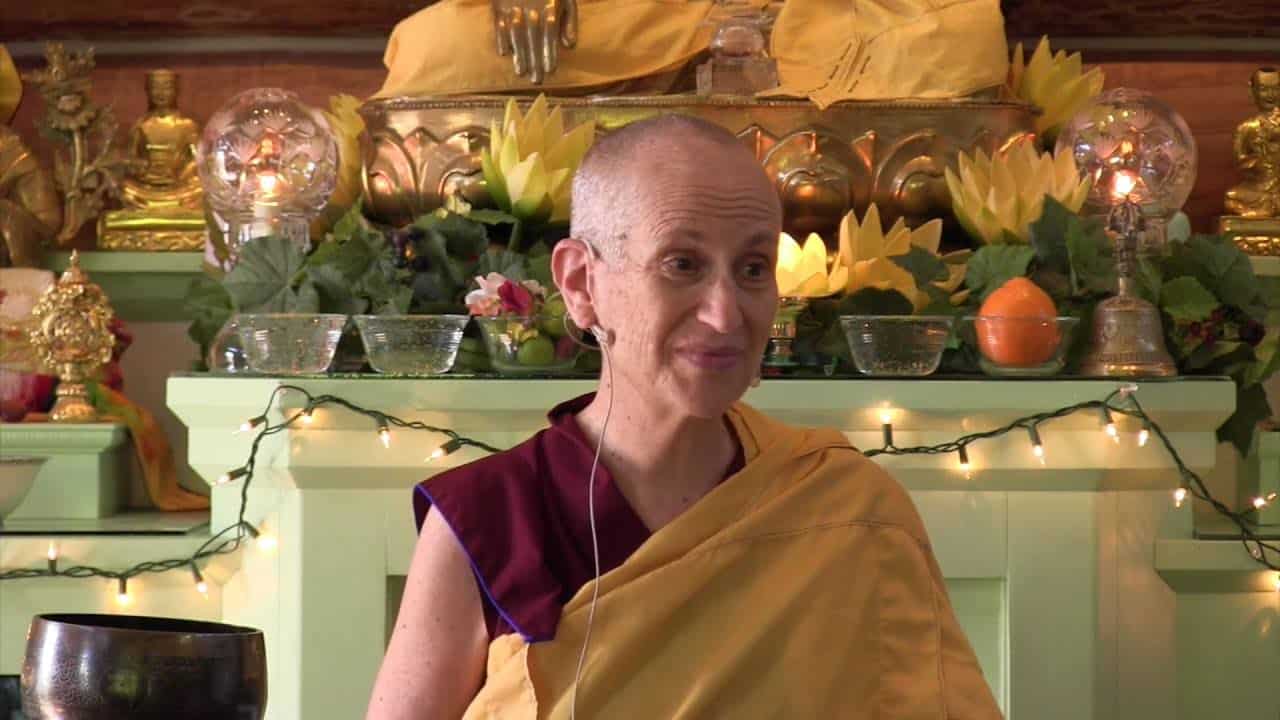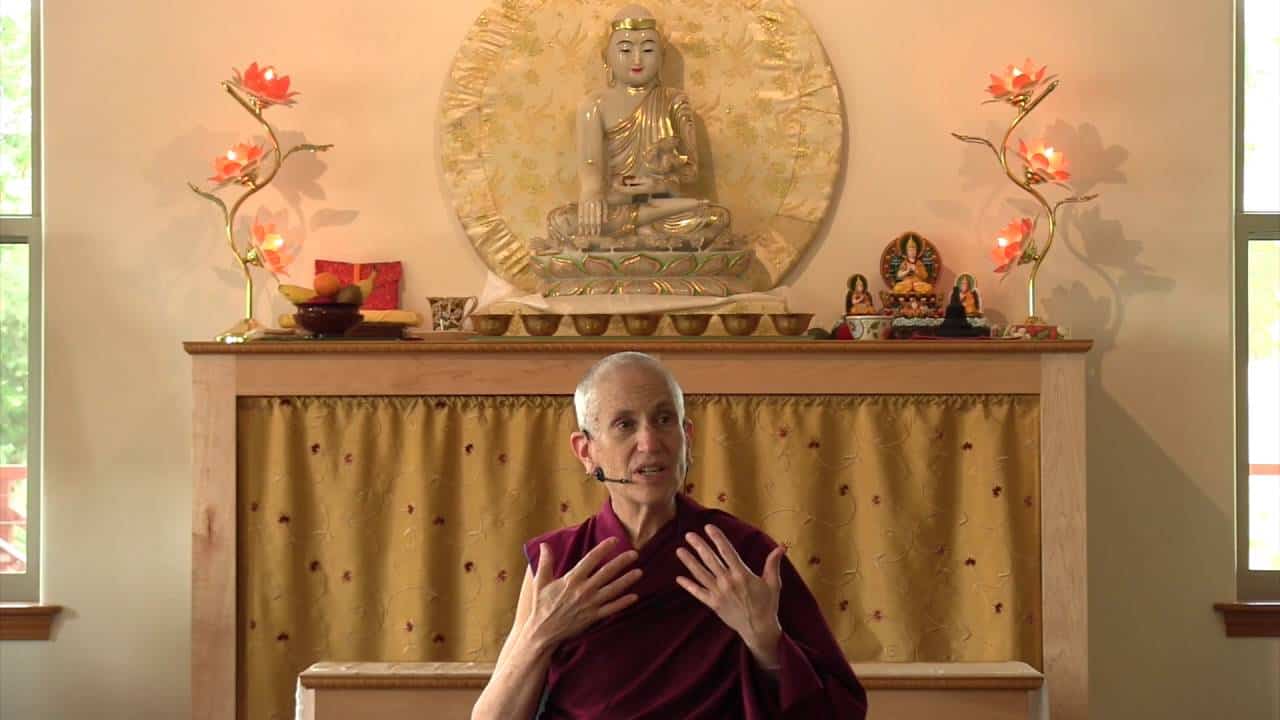The best higher attainment
The best higher attainment
Part of a series of teachings on a set of verses from the text Wisdom of the Kadam Masters.
- What spiritual practice is about
- Transforming our minds is the central purpose of Dharma practice
- The difference between looking like spiritual practice, and actual practice
Wisdom of the Kadam Masters: The best higher attainment (download)
We’ll continue with the Kadampa teachings. The second line says,
The best higher attainment is the lessening of your mental afflictions.
That describes really what Dharma practice is about, what we’re trying to do. We’re trying to lessen our mental afflictions: our ignorance; our clinging attachment and greed; our anger and resentment. And this is the best spiritual attainment, and that’s what the purpose of what we’re doing is. Sometimes people think, “Oh, I’ll practice Buddhism, then I gain exotic powers, I can read people’s minds, I can fly in space….” Or some kind of…. “I’ll become a special person and everybody will think I’m wonderful.” But that’s not the purpose of what we’re doing. The purpose is to transform our minds. And right now it’s true, we are afflicted by ignorance and clinging attachment and anger, aren’t we? They’re there. They pop up in our minds. So do jealousy and arrogance and all sorts of other delightful mental states that make us totally miserable. And what we’re trying to do is subdue those and instead cultivate love, compassion, wisdom, generosity, friendship, ethical conduct, fortitude, all sorts of good qualities, and that’s what spiritual practice is really about. It’s not about becoming someone special. It’s not about doing all sorts of ceremonies and rites and things that look exotic and mysterious. It’s about transforming our minds.
Many of you have heard this story already, but I’ll tell it again. I remember one time when I was in Hong Kong. I lived in Hong Kong for a while. And I was invited to speak at the American school there. So I gave just a general talk to the students. They were little kids. It was the elementary school. And one little child raised her hand and…. This was in the days of Uri Geller. Remember him? This was the guy who had some kind of power who at a distance could bend a spoon. So this child said, “Can you bend a spoon without touching it?” And I said, “No. But even if I could, I don’t think it would do any good.”
Those kinds of things are not the purpose of what we’re doing. We’re trying to transform our mind so we can make a positive contribution to society and make a positive contribution to the people around us.
How we are as one single human being makes a big difference in this world, because every day we deal with so many different people, and we all know if we’re in a foul mood then everybody around us gets hit by our foul mood, and then it affects them, and they affect others, and so forth. Whereas if we have a positive attitude and are optimistic and kind, that’s infectious, and that also influences the people around us. So even if we don’t do magnificent works for a worldwide charity to benefit others, still we’re doing something that is at least benefiting the people around us and having that kind of ripple effect. And so that’s what our practice is about, what we’re trying to do. And the nice thing about Buddha’s teachings is that the Buddha taught us the way to do it. Buddha didn’t just say, “Don’t be angry.” Because that doesn’t get rid of our anger at all. Does it? Since we were little kids people used to say, “Don’t be angry.” But we still got angry. But the nice thing about the teachings is that they say, okay, if you’re angry here’s how to work with your anger so that you can subdue it. And then if we practice those teachings, which involve looking at the situation in another perspective, then our anger naturally dissipates at that moment and there’s nothing to suppress or express. Of course, the anger may come again later, we have to practice some more, but the more we practice the more the anger loses its strength. And that’s really the aim of what we’re trying to do: subdue those disturbing mental factors, increase the positive ones.
I know my teachers can’t emphasize that enough to us, and I try and repeat what they say. Because really, so many people come into a spiritual or religious tradition thinking that it’s all about doing some kind of ritual or worship or something. If that changes our mind, fantastic. Then it’s serving its purpose. But if it doesn’t change our mind and it’s just something you do because you’re supposed to do it, then it really doesn’t serve its purpose at all, and it may look like a spiritual practice, but it doesn’t fulfill that purpose. So we have to always make sure that we’re in the process of lessening our afflictions.
Venerable Thubten Chodron
Venerable Chodron emphasizes the practical application of Buddha’s teachings in our daily lives and is especially skilled at explaining them in ways easily understood and practiced by Westerners. She is well known for her warm, humorous, and lucid teachings. She was ordained as a Buddhist nun in 1977 by Kyabje Ling Rinpoche in Dharamsala, India, and in 1986 she received bhikshuni (full) ordination in Taiwan. Read her full bio.


